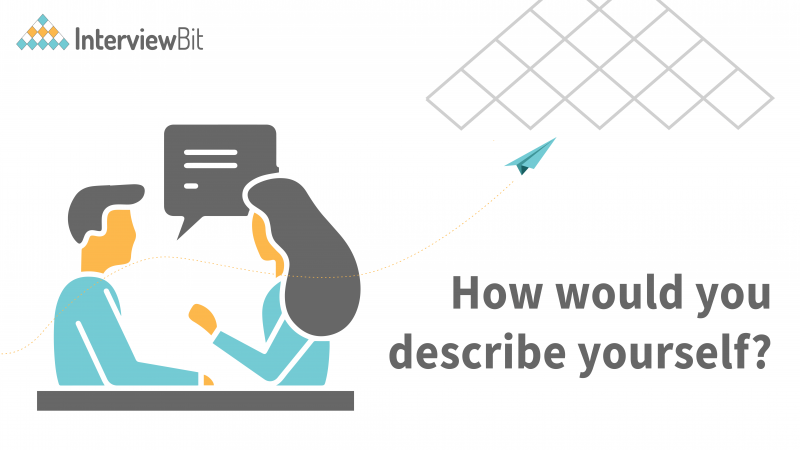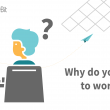- Why Do Interviewers Ask “How Would You Describe Yourself?”
- How to Answer Interview Question “How Would You Describe Yourself?”
- 1. Exhibit Your Skills and Abilities Clearly
- 2. Summarize Yourself in a Few Meaningful Words
- 3. Present Yourself as a Self-motivated Person
- 4. Emphasize Your Expertise with Results or Numbers
- 5. Present Yourself With Conviction
- 6. Use Examples From Past Jobs or Education
- 7. Focus on the Positives
- 8. Present Yourself as a Great Collaborator
- How Would You Describe Yourself Sample Answers
- What Not To Answer – “How Would You Describe Yourself?”
- Conclusion
- Important Resources
Let’s assume that you have passed out of university and now you are on the quest for lucrative job opportunities. You apply for a few jobs and, fortunately, land a job interview. The first question that your interviewer asks is – How would you describe yourself? You’re perplexed as you don’t know the appropriate answer to this question. If you don’t want to be perplexed about this question in real life, read this blog till the end.
Why Do Interviewers Ask “How Would You Describe Yourself?”
This question is almost often asked by interviewers in an effort to learn more about you and your self-perception. Being able to identify this type of question is the first move in becoming an expert at describing oneself in an interview. Another prime reason why they ask this question is that they want to recruit the best candidate for the position. They want to comprehend which potential employee can bring maximum value to the table.

How to Answer Interview Question “How Would You Describe Yourself?”
In any interview, you must make the interviewer think, “Wow! This person would be amazing in this position!” But how do you do that? The first step is to know what’s important about your background and experience. Then, tell them about it in an interesting way that intrigues them and sounds valuable to the company at the same time.
Confused about your next job?
Try using these 8 tips for describing yourself in an interview:
1. Exhibit Your Skills and Abilities Clearly
When describing yourself in an interview for any position, you need to know what skills are most relevant for the job you’re interviewing for. Make sure they are listed on your resume or cover letter, so they are clear while giving your interviewers a sense of what kind of person you are.
If you’re unsure where your strengths lie, then it’s best to avoid answering rather than trying to guess. Instead, talk about what skills and experiences have helped shape who you are today and why those experiences are relevant for this position.
2. Summarize Yourself in a Few Meaningful Words
The best way to describe yourself in an interview is to give a short but meaningful summary. Use terms that the interviewer will recall so they can introduce you to others. You must prepare a response ahead of time so you can answer confidently and promptly during the interview.
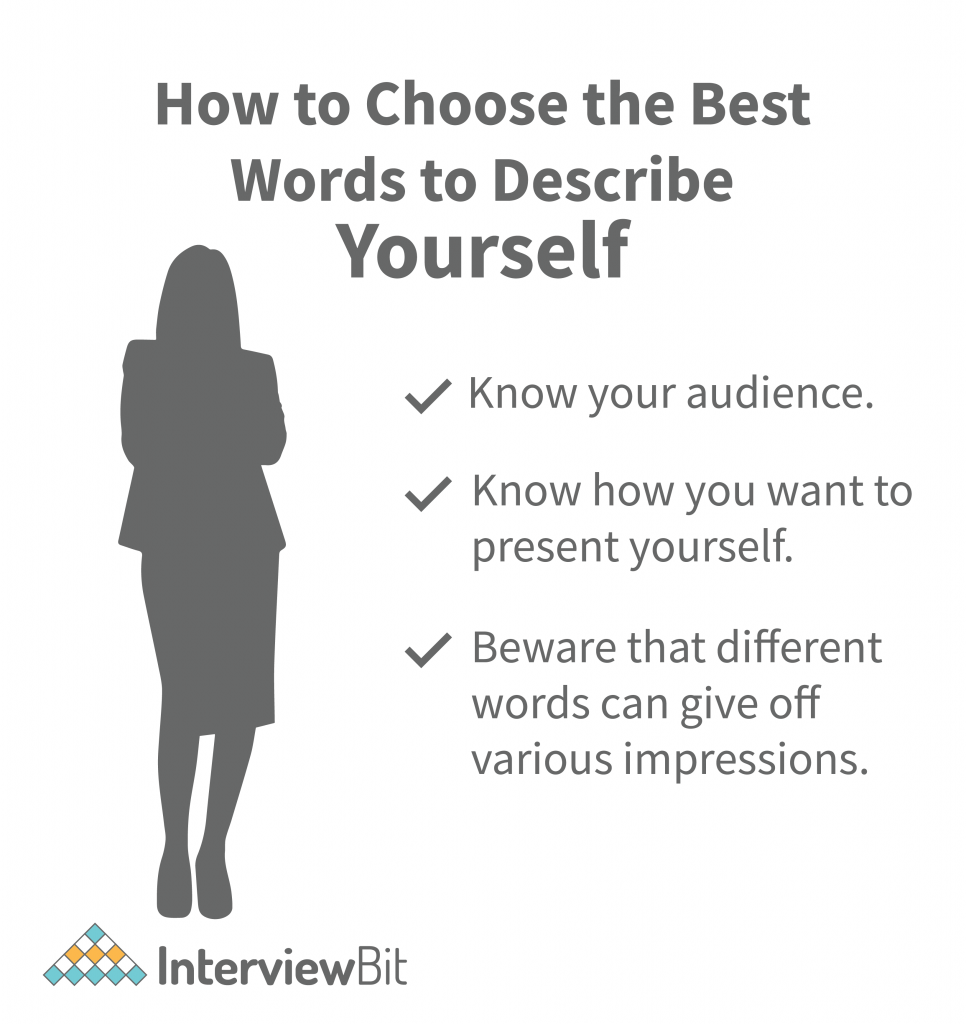
This won’t be difficult for them if you have any prior expertise in your profession. If not, try looking up job descriptions online to find out what skills are required for success at that company.
3. Present Yourself as a Self-motivated Person
The first thing to describe yourself is as a self-motivated person. This means you’re comfortable taking the initiative and doing things independently.
You can show this by mentioning past projects, such as:
- Telling them about your college experiences or events that you headed in your college.
- Elaborating on your last position as an intern at XYZ company, where you helped launch their new website by creating content for it.
4. Emphasize Your Expertise with Results or Numbers
You can provide evidence to support your claim if you’re a data scientist. For example, emphasizing the occasions where a new system has decreased costs or increased profits.
You can also mention how many individuals benefited from your work and how much money was saved. Giving yourself adequate space will allow you to articulate your results without coming off as a salesperson.
5. Present Yourself With Conviction
It is highly beneficial if you can convey the conviction and confidence you have in your skills. You ought to be aware of what you’re doing and its significance. It would be beneficial if you also have faith in your expertise and the amount of effort you put into previous endeavours and successes.

Most individuals are not very confident and hence they find it hard to deliver the answers even though they are aware of it. Even though this is a very prevalent problem amongst various aspirants, it can be addressed by dressing well, controlling the pace of the voice and showcasing open body language.
6. Use Examples From Past Jobs or Education
If you have a long employment history, you can use examples from your extensive job history that are pertinent to the position you’re seeking. Suppose you have an English literature degree from college and want to work as a writer for a tech business. Discussing your personal things in an interview might not be a good idea. Be professional when you speak.
This keeps things professional and prevents them from becoming too personal or unpleasant. It also clarifies what skill sets they seek without assuming anything about their moral compass (or lack thereof). You must discuss the activities and learning experiences you had while in school or at your first job.
7. Focus on the Positives
It’s crucial to keep your attention on the positives during the interview. Talk openly about your flaws and how you’ve dealt with them in the past. Tell him about everything that could potentially come back to haunt you in the future and explain why it won’t occur here (or at least give them an idea).
Consider a job applicant who struggles with face-to-face communication. He might not speak properly in an interview, but if he does these things, he will surely ace the interview. Instead of concentrating on what the employer can do for you, you must consider what you can do for them. Treat each interview for a job as though it were your first. Don’t try to tell them about your past successes and failures; instead, explain how your skills will help them achieve their goals at work. Don’t talk about what you don’t have experience with; focus on what makes you qualified for the job.
8. Present Yourself as a Great Collaborator
High standards and effective communication skills are essential for a great collaborator. They must be able to collaborate on duties effectively and ensure that everyone in the team knows their responsibilities. They must discuss and convey specific objectives with every team member and establish good synergy. A good collaborator will also routinely give feedback.
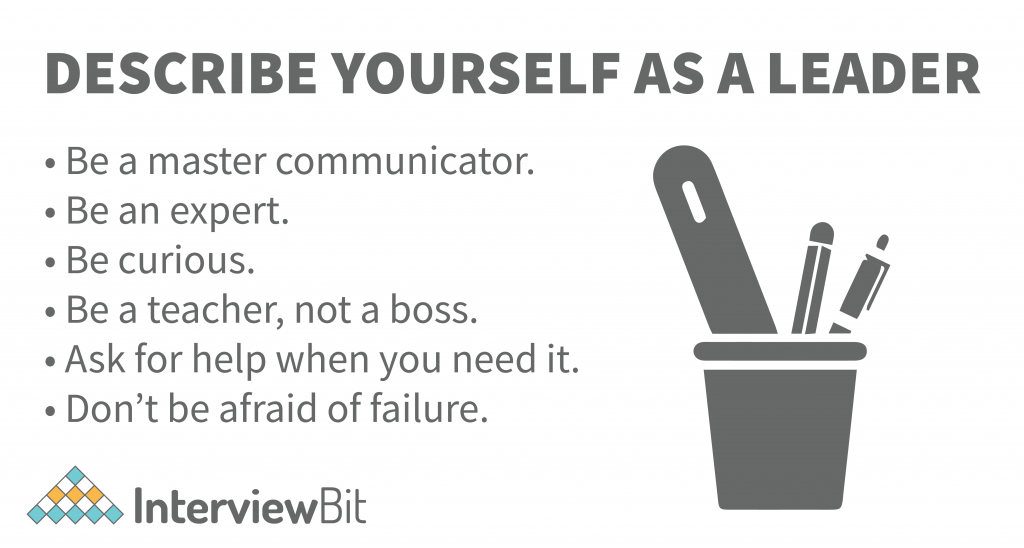
A competent collaborator should also be able to switch multiple duties as necessary while still participating in them. This is essential so that they are fully aware of what needs to be done and by when. Hence, make sure the interviewer perceives you as a capable team leader.
How Would You Describe Yourself Sample Answers
Now let’s take a glance at some of the sample answers that you can directly use to answer – “How Would You Describe Yourself?” The top three answers can be:
Sample 1:
I’m very creative, communicative, and flexible. I love collaboration and I believe that I’m a good team player. Even though I can take charge of independent projects, I prefer to collaborate with my team members.
Why it works: Your job experience will probably be in a corporate office environment, surrounded by other people. Most offices are set up in teams or with product-specific sections. This answer perfectly demonstrates your ability to get stuff done while working in a team.
Sample 2:
I would consider myself to be a very up-to-date as well as an innovative person. I’ve been looking forward to this opportunity for some time now, and I’m thrilled that you’ve shortlisted me for the interview.
Why it works: This answer shows the employer that you are an active follower of the industry and the company. And also shows your interest in the position.
Sample 3:
I believe that I’m a reliable and result-oriented person. In addition to my programming experience and my engineering expertise, I have worked on several projects of multiple sizes and complexity levels during my career.
Why it works: In a result-driven job, employers seek a result-oriented candidate. Moreover, you can showcase your expertise by mentioning your experience and previous projects.
Sample 4:
My creativity has made me an effective team leader because I can anticipate problems and innovate solutions. My ability to work alongside other assertive individuals allows me to find balance by offering innovative, on-the-spot ideas that can help my colleagues better achieve their goals.
Why it works: The answer shows the interviewer that this candidate can use their creativity when it is needed, and still understand when to be practical. The speaker is showing that they can create fresh solutions for real-world problems.
Sample 5:
I’m the kind of person who knows how to get things done. I’m passionate, diligent, and honest. I pay attention to all the details of a project, especially those that others miss. When I see something that needs improvement, or a way to streamline an existing process, I speak up and suggest my ideas.
Why it works: Sometimes, a job is only as good as its completion. Even if the employees complete a task on time, they must also strive to complete it in quality. This requires that they set reasonable expectations and goals while making the work engaging and fun — with this answer, you can show your quality-driven work aspect of yours.
Follow lines like these, which show that you are valuable to the organization. And you can be sure about acing your interview. Using these lines will not only help you in an interview, but it will also make you appear better compared to your competitors.
What Not To Answer – “How Would You Describe Yourself?”
It is generally not necessary to list all of your contributions in one response. Instead, try to focus on a few accomplishments within each category (e.g., leadership, teamwork, initiative) that demonstrate you are who the employer is looking for.
For example, while answering “How would you describe yourself”, do not go away with mentioning everything in one go! — “I would consider myself to be a very up-to-date as well as an innovative person as I have worked on an ABC project at XYZ job and also managed a team at PQ organisation. Apart from this, I also showed incredible passion while working at…“
Conclusion
The takeaway of this article summarized in one sentence would be Clear, confident and professional communication.
You want to project a professional and assured image. This entails speaking in a manner that can persuade potential employers and using confident language that reflects this image.
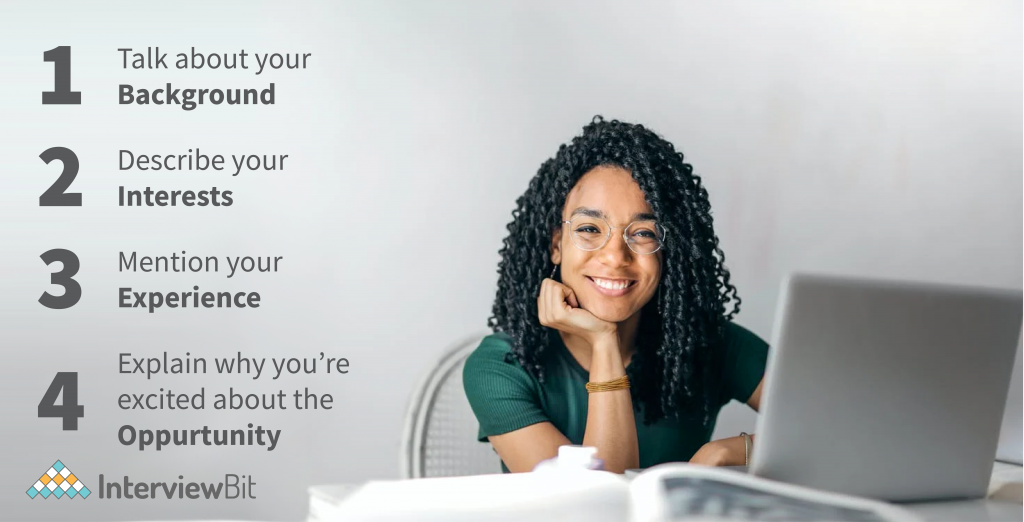
Additionally, concentrate on the outcomes rather than explaining the entire journey you underwent to achieve them. It is more convincing when your results speak for themselves. Remember to showcase your distinctive qualities in your interview so potential employers will understand the worth of employing you. Share this blog with someone who is preparing for an interview and help the person excel in his or her interview.







 Join WhatsApp Group
Join WhatsApp Group
